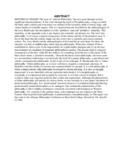| dc.description.abstract | HISTORICAL PHASES
The issue of "African Philosophy" has now gone through several signlflcaet historical phases. It first went through the myth of Pre-philosophy, a stage at
which the black man's culture and even mind was claimed 10 be extremely alien to reason, logic, and various habits of scientific inquiry. This is a situation bravely described by the anthropologists of the Levy-Bruhl type: the description is of the "primitive" man and "primitive" mentality. This mentality, so the argument went, is pre-logical, pre-scientific, pre-literate, etc.
The term "pre-philosophy" is of course a logical consequence of the culture and life of the primitive man. It leaves the hope that this culture might one day evolve into a scientific and reason-oriented culture. Yet, Levy-Bruhl and the anthropologists of his kind left no such hope: for them, the situation was that of unphilosophy rather than pre-philosophy. What they claimed 10 have established in Africa were (I) the impossibility for a philosophic dialogue and (2) an obvious non-existence of a tradition of organized philosophical systems. The second claim is a logical consequence of the first. while the first follows as a tautology from the fact of the nature of the black man's mind. a "primitive mentality."
Beyond the phase of pre-philosophy. the issue came to a second phase embodying a second myth: the myth of a unique philosophy, a specialized and wholly customsdictated philosophy. In the words of our colleague, P. Hountondji. this is "ethno-philosophy." Ethno-philosophy. as we now well know, requires a communal consensus. It identifies with the totality of customs and common beliefs of a people. It is a folk philosophy. It forms a sharp contrast with philosophy developed by reason and logic. It is also, as thought, impersonal: it is not identified with any particular individual(s). It is the philosophy of everybody; it is understood and accepted by everyone. It is at best a form of religion. But it would in other cases function perfectly like a taboo and superstition.
Although the phenomenon of ethno-philosophy still persists in various forms, we arc currently in a new phase: the phase of professional philosophy. It is "professional" precisely because it is technical philosophy having professionally trained philosophers as its managers. One remarkable characteristic of this philosophy is that it employs techniques commonly associated with European or Western philosophy. Yet, contrary to the general claim. such techniques are not unique to the West.
Current African professional philosophy is predominantly a metaphilosophy. Its
This paper was first read to the Africana Phitosophy Conference at Haverford College. Haverford. PA. July20-23.1982. | en |

